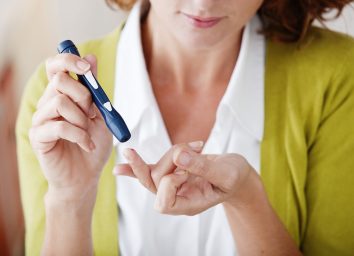55 Best Foods for People With Diabetes That Steady Blood Sugar

Monitoring how much sugar you consume on a regular basis can be helpful for anyone regardless of their state of health, but specifically for those living with diabetes, too much sugar can open up a whole slew of potential dangers. Thankfully, if you know some of the best foods for people with diabetes, you can help keep your diabetes under control and avoid some of the potential risks.
But first, let’s look at what diabetes is and what it can lead to if left unmanaged. According to the National Institute of Diabetes and Digestive and Kidney Diseases, you can develop diabetes when your blood sugar levels are chronically too high. This disease also directly impacts how much insulin your pancreas can produce, which is the hormone needed to push glucose into your body’s cells for energy. When you aren’t producing enough insulin, the glucose remains in your blood.
If your diabetes is left unmanaged, meaning your blood sugar constantly remains at levels that are too high, it can lead to an increased risk of kidney damage, heart disease, and even damage nerves that go to your feet and the blood vessels that are in your eyes, which can lead to blindness. So, how does someone manage their diabetes?
This can involve a number of lifestyle factors, such as exercising, avoiding smoking, and managing stress, losing weight if needed, but one of the main ways to control your diabetes is to eat foods that are friendly for people with diabetes that won’t spike your blood sugar too much. This means limiting—but not completely eliminating—foods that are high in sugar and refined carbohydrates, which will spike your blood glucose more rapidly.
Thankfully, there are still plenty of delicious, satisfying foods that people with diabetes can treat themselves to, without having to worry about their health and blood sugar. These foods are going to be higher in nutrients like fiber, healthy fats, and proteins, all of which will help the items be more slowly digested and will therefore allow better blood-sugar control.
Read on for the ultimate list of foods for people with diabetes. Then, make sure to check out the 9 Worst Foods for Blood Sugar.
Best starches for people with diabetes

People with diabetes can still eat carbs, but according to the American Diabetes Association’s Diabetes Plate Method, they should fill one-quarter of their plate with fiber-filled complex carbohydrates, fruit or milk or yogurt. Choosing complex carbohydrates, like starches, that provide vitamins, minerals, and blood-sugar-balancing fiber is important. Here are a few better-for-you options.
Quinoa
This nutty, trendy whole grain is a good source of fiber and protein, making it a smart pick for a diabetes diet, registered dietitian nutritionist Sarah Koszyk, RDN tells us. “With the fiber and protein combination found in quinoa, you’ll feel fuller and have better blood sugar control. Protein also helps with the uptake of carbohydrates so the body can process them more easily. I suggest enjoying quinoa in a salad or casserole.”
Beans
“Beans provide a notable combination of plant protein and soluble fiber that can help boost feelings of fullness and manage blood sugar levels,” Jackie Newgent, RDN, culinary nutritionist, and author of The All-Natural Diabetes Cookbook explains. “Replacing some meat with beans can play a helpful role in heart health,” which is particularly important for diabetics as heart disease is one of the most common complications of diabetes. Consider adding kidney beans to soups and black beans to your casseroles to boost your intake of the legumes.
Oats
“Oats contain a type of fiber called beta-glucan, which seems to have an anti-diabetic effect,” explains Newgent. Specifically, a review published in Vascular Health and Risk Management concluded that beta-glucans help to reduce high blood sugar and blood pressure, adding, “I advise people with diabetes to steer clear of added sugars by enjoying savory rather than sweet oatmeal.” Try making oatmeal overnight with one of our overnight oats recipes for weight loss.
100% Whole Wheat bread
Elizabeth Snyder, RD, LD, CDE says you can still eat carbs if you’re a person with diabetes. You just have to watch out for portion sizes: “The trouble [with eating carbs as a person with diabetes] lies in eating more carbohydrates than we need, as the body will choose to store any extra energy as fat,” she says. So, rather than cutting out carbs entirely, Snyder recommends switching to complex carbs, such as 100% whole wheat bread, which are higher in vitamins, minerals, and blood-sugar-managing fiber than their simple, refined counterparts.
Chickpeas
Like other beans, chickpeas are a high-fiber legume that can be eaten instead of animal protein, Nicole Anziani, MS, RD, CDN, CDE, a registered dietitian and certified diabetes educator, recommends. Roasted and seasoned chickpeas also make for a good high-fiber, low-carb snack compared to other high glycemic options such as pretzels and potato chips.
Wild Rice
You don’t have to give up rice entirely if you’re someone with diabetes. Anziani likes wild rice because it’s high in fiber. She says it’s an ancient grain that is actually a grass and is high in manganese, zinc, and folate.
Sweet Potato
Anziani says that although sweet potatoes are starchy, they’re rich in beta-carotene, which is converted into the essential vitamin A. Sweet potatoes are also lower on the glycemic index than regular white potatoes, cementing their place among the best foods for diabetics. Treat sweet potatoes as your main starch for the meal and stick to a serving size—about ½ a cup baked or roasted. Keep the skin on for extra fiber.
Edamame
“Edamame delivers a unique nutrition profile that could offer multiple benefits for those living with diabetes,” Jenna Braddock, RDN, CSSD, sports dietitian and blogger at MakeHealthyEasy, which is why they earn a spot on the list of best foods for those with diabetes. “First, the fiber content of one cup is a staggering 10 grams, which could be very helpful in regulating blood sugar spikes and also contributes to reducing risk for heart disease. Second, as a plant-based source of protein, it could help reduce disease risk factors when it replaces meat in the diet. Lastly, edamame is a good source of the essential nutrient choline, and research shows that 9 out of ten Americans don’t get enough of in the diet. Choline is important for helping to reduce homocysteine levels in the blood, a marker connected to increased risk of heart disease and connected to vascular disease in diabetes.”
Hummus
Instead of large portions of high-fat cheese or regular mayo, Anziani recommends hummus as a dip for veggies or low-carb crackers. “[Hummus] contains protein and a lot of taste for lower glycemic snacking,” she says.
Shirataki Noodles
Even people who have diabetes can enjoy pasta. Shirataki noodles are made from yam flour for a low-carb and super low-calorie option. “These noodles have 0-20 calories per package and can be prepared in meals that would call for carby noodles,” Anziani says.
Flax Crackers
Instead of other high-carb crackers, opt for high-fiber flax crackers. They’re an excellent base for hummus, guacamole, or turkey slices. We like Mary’s Gone Crackers Super Seed Crackers which are just 160 calories per serving and have 19 grams of carbs, 3 grams of fiber, 0 grams of sugar, and 3 grams of protein.
Lentils
Lentils are rich in something called resistant starch: a type of carb that has a very minimal impact on your blood sugar levels because it passes through the body undigested and ultimately ends up feeding the healthy bacteria at the bottom of your digestive tract. So, not only will lentils help keep your blood sugar levels more even-keeled, they’ll also help to improve your gut health.
Best proteins for people living with diabetes

Some of the best foods for people with diabetes that are high in protein are both lean sources of protein, like skinless chicken, as well as fatty options, such as fish, which provide you with essential amino acids, vitamins, and minerals, making them excellent options for individuals looking to maintain stable glucose levels while promoting overall health.
Lean Chicken
Anziani recommends a lean protein like chicken because it’s nearly pure protein, highly satiating, and versatile for a variety of recipes. “A good portion of protein is a palm-sized piece at meals, or about 22 grams per meal,” she says.
Turkey
For another lean source of protein, turkey is the perfect solution. In a 3-ounce serving of ground turkey, you’ll get about 23 grams of lean protein, and zero carbohydrates. This will help regulate your blood glucose, while also keeping you feeling full, in the same way that lean chicken can.
Vegan Protein Powder
Smoothies, especially those with a lot of fruit, can have too much sugar for those living with diabetes. But a good high-quality, low-sugar vegan protein powder can be an excellent addition to a breakfast smoothie when shaken with unsweetened almond milk says Anziani. Blend a low-sugar, high-protein smoothie with spinach, chia seeds, unsweetened almond milk, and a handful of berries for sweetness.
Eggs
Eggs are a great source of protein. Anziani recommends opting for pasture-raised, organic omega-3 eggs. “The yolk will concentrate the omega-3 fed to the chickens,” she says, adding that these eggs are “a good source of choline and protein, but limit to under five per week.”
It’s also important to note that all eggs are a good source of choline and protein, no matter how they’re raised.
Sardines
These fatty fish are some of the healthiest cold water fish, says Anziani. “[Sardines are] extremely convenient to eat when packaged as boneless and skinless in extra virgin olive oil,” she says. Pour them over a salad with the olive oil dressing for a boost of healthy fats and protein to keep your blood sugar stable.
Salmon
“Salmon is a smart addition to anyone’s eating plan, but for individuals with diabetes, it’s especially beneficial,” Lori Zanini, RD, CDE, a registered dietitian and certified diabetes educator, tells us. Here’s why: “It’s a healthy protein source that will not raise blood sugar levels and will help to decrease the risk of heart disease and stroke—a major concern for diabetics.” Salmon’s heart-healthy qualities come from its high levels of omega-3 fatty acids. This particular fat reduces levels of triglycerides, a risk factor for coronary heart disease, according to a review in the journal Endocrine Practice.
Greek Yogurt
Looking for a protein-packed way to fuel your morning? Greek yogurt is the answer. “It naturally contains both carbohydrates and protein, which is a perfect combination to help control hunger levels and blood sugars,” says Koszyk. “Plus, choosing Greek yogurt will give you more protein and fewer carbohydrates than regular yogurt, which can help better control blood-sugar levels. Enjoy yogurt in a smoothie or as a snack paired with some berries and chia seeds.”
Organic Tofu & Tempeh
Although vegetarians might have a tougher time getting protein in their diet, Anziani recommends organic tofu. Tofus absorbs the flavor of whatever it is cooked with, making it extremely versatile. Another high-protein option is tempeh, a fermented soy protein that can replace animal protein. However, those with a thyroid condition should only consume tofu or tempeh two to three times a week.
Tuna Fish
Want to continue munching on your favorite crackers without fretting too much over your blood sugar levels? Consider pairing the crunchy snack with a can of tuna. Depending on the amount of healthy fats and protein you pair with your carb-laden snack, your body can digest the carbs much slower than you could if you ate the carbs alone. In fact, Tufts University researchers recently presented the results of a study which found that eating protein- and fat-rich tuna fish with a slice of white bread produced a slower rise in blood sugar than when eating carbs alone.
People with diabetes do need to watch their sodium levels, so look for lower-sodium options at the store when you’re buying canned tuna.
Mackerel
As we previously mentioned with salmon, tuna, and sardines, fatty, high-protein fish are ideal for those with diabetes because these fish won’t cause a spike in your blood sugar, they’re healthy for your heart, and they can help keep you feeling full and satiated. For another type of fish that fits this bill, try mackerel, which you can enjoy fresh, frozen, or canned.
Best vegetables for people with diabetes

Packed with essential nutrients and low in carbohydrates, certain non-starchy vegetables have been hailed as the best choices for individuals with diabetes. According to the American Diabetes Association’s Diabetes Plate Method, people with diabetes should fill up half their plate with low-carbohydrate vegetables.
Spinach
“Leafy greens, like spinach, are great non-starchy vegetable options because they contain lutein, an important nutrient for eye health. This nutrient is essential for people with diabetes since they have a higher risk for blindness than those without diabetes,” explains Newgent. That’s not all spinach has going for it. A study published in the journal Archives of Internal Medicine found that adults who consumed 4,069 milligrams of potassium per day had a 37 percent lower risk of heart disease compared to those who consumed only 1,793 milligrams. Just one cup of cooked spinach contains 839 milligrams of potassium (which is equivalent to what’s in 2 medium bananas) or 20 percent of that target intake.
Broccoli
“Cruciferous vegetables like kale, broccoli, cauliflower, brussels sprouts and cabbage are high in something called sulforaphane,” registered dietitian Miriam Jacobson, RD, CDN says. “The compound helps reduce oxidative stress and vascular complications associated with diabetes like heart disease and neuropathy, a term used to describe a problem with the nerves.”
Bell Peppers
Red, green, orange, and yellow bell peppers aren’t just colorful additions to your salad; they’re also among the best foods for people with diabetes, as they’re blood sugar-friendly snacks all on their own. They have a sweeter taste without the sugar content of most fruit (about 3 grams of sugar per medium bell pepper). Anziani also likes how they are rich in vitamin C and also have a satisfying crunch. Slice them up and enjoy them as a snack with hummus or guacamole.
Broccoli Sprouts
You may not think much of broccoli sprouts when they pop up on your salad or sandwich, but these little guys are a powerful anti-inflammatory. They’re packed with sulforaphane, which may help protect against cancer according to a study published in Cancer Prevention Research. Rich in fiber, broccoli sprouts are “a potent detoxifier and play a role in decreasing cancer risk,” says Anziani.
Zucchini
If you love spaghetti and meatballs, swapping in veggies for grains should be your go-to move if you have diabetes. “Zucchini noodles and spaghetti squash are both easy and delicious ways to lower the amount of carbohydrates in some of your favorite dishes,” says Zanini.
Garlic
Despite what you may think, nixing sugar or salt doesn’t have to be synonymous with bland, cardboard-like dishes. “So often, we think about what we can’t eat when we start cutting out sugar. Instead, focus on ways to add more flavor to the foods you are eating,” suggests Zanini. “There are so many great ways to add flavor without adding sugar or salt.” Add a couple of crushed cloves of garlic to your marinara sauce or saute broccoli in a blend of extra virgin olive oil, chopped garlic, and crushed red pepper flakes.
Bok Choy
“All vegetables are good sources of nutrition but dark green leafy vegetables like kale, spinach, bok choy, mustard, and broccoli provide vitamins like A, C, E, K, and folate as well as fiber, iron and several minerals like calcium,” Byron Richard, MS, RD, CDE, Clinical Nutrition Manager UC San Diego Health, says, “Leafy greens, as most non-starchy vegetables, have a low GI are low in calories and carbohydrates.”
Celery
Celery is a low-carb food that makes for an easy snack; Anziani likes that celery is nearly calorie-free. Slice up some celery to dip in hummus or fill with almond or peanut butter.
Kale
Kale is called a superfood for good reason! Rich in fiber—with 16 grams, or over 60 percent of your daily recommended intake, of the digestion-slowing nutrient in just one cup—and low on the glycemic index, kale can help with blood glucose control.
Asparagus
Your favorite grilled veggie is more than just a tasty side. Because asparagus is rich in folate—just four spears contain 89 micrograms of the nutrient, or roughly 22 percent of your recommended daily value—it’s one of the best foods for those who have diabetes. According to a meta-analysis published in Diabetes Research and Clinical Practice, folic acid supplementation can lower cardiovascular risk among patients with Type 2 diabetes by reducing homocysteine levels, an amino acid that’s been linked to increased risk of mortality when present in high levels in diabetic patients.
Cauliflower
Check out the power of the cauliflower. Grate it up, and cauliflower rice is a great low-carb substitute for refined white rice, which can help keep your blood sugar levels more stable. Plus, cauliflower is rich in sulforaphane: a compound which a Science Translational Medicine study found can inhibit glucose production in cells and improves glucose tolerance in rodents on high-fat or high-fructose diet.
Carrots
Instead of reaching for pretzels, chips, or another high-carb, high-calorie snack, carrots make for a healthy, low-calorie alternative. They are packed full of fiber, vitamins C and K, and potassium and beta-carotene (which is the antioxidant form of vitamin A), and make for a good low-carb snack when dunked in hummus or guacamole.
Red Onion
Trust us: it’s worth the tears. A Canadian study published in the American Journal of Clinical Nutrition discovered that a type of gut-healthy insoluble fiber found in onions, called oligofructose, can increase levels of ghrelin—a hormone that controls hunger—and lower levels of blood sugar. This allium can help people with diabetes in another way, as well. Thanks to their bioactive sulfur-containing compounds, onions can help lower cholesterol, ward off hardening of the arteries, and help maintain healthy blood pressure levels, according to a study published in the Evidence-Based Complementary and Alternative Medicine.
Pro tip: Eat your onions raw whenever you can for better benefits; a Journal of Agricultural and Food Chemistry study found the cholesterol-lowering properties were stronger in onions that were raw compared to those eaten cooked. Think: pico de gallo, sliced onions on sandwiches and burgers, or served in a Greek cucumber and tomato salad.
Cabbage
Cabbage is often overlooked, but this versatile vegetable is full of flavor, nutrients, and is perfect for diabetics. It’s low in calories and provides a decent amount of fiber, meaning it will help slow the digestion of what you’re eating and won’t cause a spike in blood sugar. You can sauté cabbage, add it to a sandwich, or make a delicious coleslaw with it.
Tomatoes
The American Diabetes Association considers tomatoes to be a low-carb vegetable, even though many people classify them as a fruit.
Instead of choosing starchier veggies that can raise blood sugar, Anziani likes tomatoes to add to a salad or as a snack for a flavorful option that’s low-calorie. They are also a good source of the antioxidant lycopene, which can help fight inflammation.
Best fruits for people with diabetes

Fruits can be a solution to satisfy your sugar cravings – however, they should be consumed in small portions and complemented with a protein, fat or fiber to help keep blood sugar levels in check. With their natural sweetness and high fiber content, certain fruits are considered the best foods for individuals living with diabetes.
Berries
Fruits can be a solution to satisfy your sugar cravings – however, they should be consumed in small portions and complemented with a protein, fat or fiber to help keep blood sugar levels in check. With their natural sweetness and high fiber content, certain fruits are considered the best foods for individuals living with diabetes.
Bitter Melon
Bitter melons aren’t all that common; after all, as the name suggests, they are very bitter, Anziani says. However, she adds that it has been proven to lower blood sugar. A study published in the Journal of Ethnopharmacology found that 2,000 milligrams of bitter melon a day lowers blood glucose levels in people with type 2 diabetes.
Apricots
Apricots are a great snack if you’re in the mood for something on the sweeter side, and because they’re lower on the glycemic index, they won’t spike your blood sugar like higher glycemic fruits would. In one apricot, you’ll get less than four carbohydrates and almost one gram of fiber, which will help your body slow its digestion.
Apples
Another delicious and filling fruit snack is an apple, which provides around 5 grams of fiber. Because it is high in fiber, it will help slow the digestion process and won’t spike your blood sugar like some other sugary foods would. You can bite right into one or cut it up and enjoy the slices with your favorite nut butter for added protein and healthy fats.
Best nut, seeds, and spices for people with diabetes

Nuts and seeds are some of the best foods for people living with diabetes, as they are packed with healthy fats, fiber, and essential nutrients.
Peanut Butter
“When living with diabetes, eating a filling breakfast is an essential way to start the day,” says Erin Spitzberg, MS, RDN, CDE, a certified diabetes educator and author of Eat Like a Normal Person. “Adding a little fat for added satiety can help,” she explains. She recommends pairing up your favorite breakfast carb—either a slice of whole grain toast, bowl of steel-cut oats, or high-fiber cereal—with 1 tablespoon of natural peanut butter. “The peanut butter adds approximately five grams of fat, which will help slow digestion and keep you full a little longer.”
Ground Flaxseeds
Add a satisfying crunch and healthy fat to your favorite oatmeal, salad, soup, or smoothie with the help of ground flaxseeds, a potent superfood for people with diabetes. “Ground flaxseeds contain lignans (a plant-based chemical compound) and fiber which help maintain blood sugar levels and glycemic control,” Koszyk explains.
Raw almonds
“I often recommend an ounce of almonds as a snack,” Zanini tells us. “Almonds don’t raise blood sugar levels and are a great source of magnesium, a nutrient that improves insulin sensitivity.”
Chia Seeds
“Chia seeds are a heart-healthy fat that contains fiber and omega-3s,” Koszyk explains. “Research suggests that chia seeds help control blood glucose. And it’s all thanks to the fiber content slowing the passage of glucose into the blood. Also, fiber fills us up which reduces our appetite and helps us eat less.” Koszyk suggests enjoying chia seeds in yogurt, fruit and veggie smoothies, or salads.
Walnuts
Nuts are some of the best foods for people with diabetes since they are lower in carbs, higher in healthy fats, and higher in fiber. Walnuts are one of the best nuts available because of their higher omega-3 content Anziani says—one serving (about ¼ a cup) has almost 3 grams of omega-3s. Just be sure to stick to one serving size so as not to go overboard on calories.
Cinnamon
A series of reviews printed in the American Journal of Clinical Nutrition discovered that adding a heaping teaspoon of cinnamon to a starchy meal like overnight oats could help stabilize blood sugar, ward off insulin spikes, and decrease fasting blood sugar. Experts believe that the spice’s powerful antioxidants, known as polyphenols, are at work; these active compounds have been proven to improve insulin sensitivity and, in turn, your body’s ability to store fat and manage hunger cues.
Pistachios
If you’re in the mood for a salty snack, skip the potato chips and pretzels and reach for a handful of pistachios.
Pistachios are a protein-rich nut that also contains a few grams of fiber, making them the perfect healthy snack for diabetics. Not only will they not spike your blood sugar, but they’ll keep you full longer than a snack with less protein and fiber. And another added benefit is that if you buy them shelled, you’ll eat them more slowly and may ultimately consume less.
Best healthy fats for people with diabetes

Healthy fats are some of the best foods for people with diabetes as they can help regulate blood sugar while also supporting heart health and managing inflammation levels. The ADA’s Diabetes Plate Method recommends a person with diabetes add a small amount of health fat during each meal.
Avocado
What’s better than avocado toast? Perhaps it’s the fact that this fatty fruit can help you maintain healthy blood sugar levels, making it one of the best foods for diabetics watching their blood glucose levels. “Avocados contain a significant amount of healthful fats and dietary fiber, which help slow carbohydrate digestion and absorption and prevent spikes in blood sugar,” Newgent tells us.
Extra Virgin Olive Oil
It’s time to upgrade your cooking oil. Extra virgin olive oil is rich in monounsaturated fats, which studies show can actually help lower levels of ‘bad’ LDL cholesterol. This is particularly important since people who have diabetes have a higher risk of experiencing a heart attack or stroke. And get this: Snyder says losing just 7 percent of your body weight (if you’re overweight) can result in significant health benefits for diabetics. Luckily for you, EVOO is rich in oleic acid, which a Journal of Lipid Research study found helps reduce lipogenesis, or fat formation. It is still important to remember that 1 tablespoon of EVOO has 120 calories—so consume in very small amounts.
MCT Oil
MCT oil, named for the medium-chain triglycerides, a type of fatty acid, has been praised for its brain-boosting benefits, but it can also be used in small amounts to replace other fat sources. “MCT oil can be used in smoothies or drizzled over salads,” Anziani says, “It is tasteless and may be used as fuel preferentially, versus being stored as fat.”
Dark Chocolate
Watching your blood sugar doesn’t mean you have to give up dessert entirely. Dark chocolate that’s 60% cacao or above can have health benefits without spiking blood sugar; just pay attention to the ingredients and nutrition label. “One ounce or square can be consumed per day to strategically lower the stress hormone cortisol and keep milk chocolate cravings at bay,” Anziani, says. Cacao is also rich in antioxidants, which can help fight inflammation.
Best drinks for diabetics

Ditch the blood-sugar-spiking soda and opt instead for low-carb, low-calorie drinks that are as hydrating as they are beneficial for those living with diabetes.
Green Tea
Zanini is a huge fan of green tea—and with good reason. Because it is hydrating and filling, green tea can help prevent overeating, which will both stabilize blood sugar levels and aid weight loss efforts by boosting feelings of satiety. “This drink also increases your metabolism and reduces fat storage,” Zanini adds. Remember that green tea does have caffeine, and the FDA recommends no more than 400 milligrams of caffeine per day.
Seltzer
Instead of sodas and sweetened beverages, which can pack up to 40 grams of sugar per serving and can wreak havoc on blood sugar levels, Anziani recommends opting for unsweetened seltzer instead. Try a low-calorie flavored brand like Spindrift, or buy plain club soda or seltzer and flavor yourself with a squeeze of lemon, lime, or fresh mint sprigs.
Bone Broth
Bone broth is rich in collagen, which can make for a protein-packed and satiating snack and one of the best foods for people with diabetes., Anziani says. Sip some warm broth for an afternoon snack to keep you satisfied until dinnertime. Just watch the sodium—opt for no added sodium or low-sodium whenever possible.
- Source: https://www.niddk.nih.gov/health-information/diabetes/overview/what-is-diabetes
- Source: https://www.ncbi.nlm.nih.gov/pmc/articles/PMC2663451/
- Source: https://fdc.nal.usda.gov/fdc-app.html#/food-details/171506/nutrients
- Source: http://journals.aace.com/doi/10.4158/EP161445.RA?url_ver=Z39.88-2003&rfr_id=ori:rid:crossref.org&rfr_dat=cr_pub%3dpubmed
- Source: https://www.ncbi.nlm.nih.gov/pubmed/21747015
- Source: http://cancerpreventionresearch.aacrjournals.org/content/2/4/353
- Source: https://www.diabetesresearchclinicalpractice.com/article/S0168-8227(12)00215-X/abstract
- Source: https://www.ncbi.nlm.nih.gov/pmc/articles/PMC3827013/
- Source: https://www.ncbi.nlm.nih.gov/pmc/articles/PMC4594049/
- Source: https://www.ncbi.nlm.nih.gov/pubmed/22881190
- Source: https://www.ncbi.nlm.nih.gov/pubmed/21211558/
- Source: https://fdc.nal.usda.gov/fdc-app.html#/food-details/171688/nutrients
- Source: https://academic.oup.com/ajcn/article/85/6/1552/4632985
- Source: http://www.jlr.org/content/48/9/1966.full









